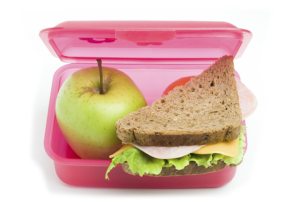Back to work and school: don’t put yourself or child at risk by not keeping packed lunches cool
Media release: 24 January 2012
The Australian Food Safety Information Council today released a national survey that shows on warm days 8% of workers who take a packed lunch make no attempt to keep their packed lunches cool. Of even more concern, 20% of those with children who take a packed lunch to school don’t provide their children with a frozen drink or ice brick to help keep their packed lunch cool.
Council Chairman, Dr Michael Eyles, says that this could be a major food poisoning risk as 79% of adult Australian workers say they take a packed lunch and almost all of households with children say their children have a packed lunch.
‘Packing a lunch for yourself or your child is a healthy and cost effective option. However food poisoning bacteria can grow quickly during hot weather and in the healthier foods, such as salad and cold meat, that we pack for lunch these days,’ Dr Eyles says.
‘You can reduce your risk of food poisoning by simply packing a frozen juice box, water bottle or commercial ice pack with the lunch. Place perishable foods such as cheeses and sandwiches between the frozen items. Leave food refrigerated until just before you leave home.
‘Children’s lunchboxes kept inside the school bag will keep cooler longer especially if the bag is kept away from heat sources such as direct sunlight. There is no need to refrigerate school lunches if they are stored with a frozen drink.
‘Adults should store their lunches in a workplace fridge or cooler bag or esky. Remember to continue to do this in cooler weather as heating in buildings can also raise the temperature.
‘Employers can assist by making refrigerators and coolers available and ensuring a workplace roster for keeping fridges and kitchens clean. They can also supply pens and labels for people to label their food with name and date. Handwashing and drying facilities should be made available in kitchens and handwashing posters put up. This could lead to a reduction in sick leave, not just from food poisoning but also viruses such as colds and flu.
‘Other key lunchbox tips are to ensure you prepare food with well washed hands and utensils and always wash your hands before eating lunch. If you are reheating leftovers ensure they are heated all the way through until steaming hot. Lunchboxes and reusable drink bottles must be thoroughly washed and dried daily. If cracked, split or crazed, replace as bugs will grow in any cracks.
‘Throw out any leftovers that haven’t been refrigerated. If you or your child has food poisoning don’t go to work or school, and avoid handling food for others for 48 hours after symptoms such as vomiting and diarrhoea stop. If food poisoning symptoms persist, visit a doctor,’ Dr Eyles concludes.
The national survey by Newspoll found:
- Four in every five Australian workers (79%) say they have a packed lunch, with skews toward females, those aged under 50, and those with a college education or an apprenticeship.
- Among those that do take a packed lunch to work a large majority of 77% say that on warm days they store their lunch in a refrigerator at work, and around half say they their lunch is stored in cooler bag or esky.
- There is some overlap between the two – suggesting that some of those who are putting their lunch in a fridge are using other methods to keep their lunch cool on the way to or from work, or when they are out of the office.
- Overall more than 9 in 10 who have a packed lunch (92%) use one of these approaches to keep their lunches cool on warm days. Men and those living outside of Queensland / NT are the most likely to fall down in this area.
- Almost all of those with children in their household say those children have a packed lunch. While most say that on warm days their children have a frozen drink or ice brick to help keep their packed lunch cool, 1 in 5 say this is not the case.
- Those living in the major capital cities appear to be the worst offenders when it comes to keeping children’s lunches cool, with 24% in these areas saying they don’t do this compared with 12% in the regional and rural areas.
Food poisoning results, on average, in 120 deaths, 1.2 million visits to doctors, 300,000 prescriptions for antibiotics, and 2.1 million days of lost work each year. The estimated annual cost of food poisoning in Australia is $1.25 billion.
The Food Safety Information Council is Australia’s leading disseminator of consumer-targeted food safety information. It is a non-profit entity supported by the Australian Department of Health and Ageing, state and territory health and food safety agencies, local government, and leading professional, industry and community organisations.
CONTACT: Juliana Madden, Executive Officer: 0407 626 688
FURTHER INFORMATION: Work and school lunch safety

